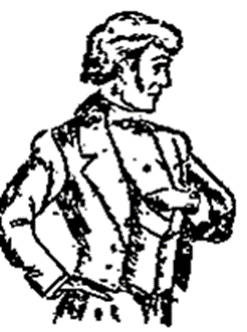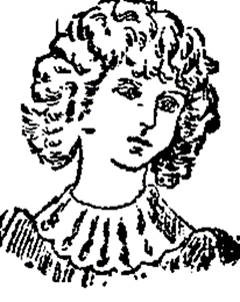This article has been transcribed from a copy of the Cardiff Times in the online collection of scanned Welsh newspapers 1804-1919 in the National Library of Wales, with grateful recognition of the free access accorded to all readers. Paragraph breaks have been introduced for easier reading.
Explanatory notes
'They came as a boon and a blessing to men, / The Pickwick, the Owl, and the Waverley pen': Macniven and Cameron Ltd. of Edinburgh, later known as Waverley Cameron Ltd., advertised their pen-knibs with this doggerel. Their advertisement over the entrance to Waverley Station in Edinburgh ensured its international celebrity.
Norval, … the Grampian Hills: the Scottish broadside ballad, 'Norval on the Grampian Hills', was very widely known.
Horatius did deeds of daring: see 'Horatius at the Bridge' from Lays of Ancent Rome (1842) by Thomas Babington Lord Macaulay (1800-1859). This recitation had staying power, and was still being taught in English primary schools after World War 2.
[1]'Sally in our Alley' is a song by Henry Carey (1725.)
Come into the garden: a setting of Tennyson’s 'Come into the Garden Maud', from his Maud (1855) and set to music by John Barnett in 1856 and (more famously) by Michael William Balfe in 1857, and by a number of others since. [Listen to Balfe’s version.]
soldiers: 'Yes, let me like a soldier fall', from the opera Maritana (1845) by William Vincent Wallace, words by Edward Fitzball:
Yes! let me like a soldier fall,
Upon some open plain,
This breast expanding for the ball
To blot out ev'ry stain.
Big top note: 'Yes, let me like a soldier' famously has a top C. (See James Joyce’s story 'The Dead'.)
Sandow: Eugen Sandow, German body-builder and showman, 1867-1929, who appeared in a strongman competition in London in 1889.
Italian fasting man: Giovanni Succi (1853-1918), who helped make starvation a public entertainment, with, for example a fast of 40 days at London's Royal Aquarium in 1890. He died in an asylum in Florence in 1918.
Mephistopheles … by and bye: this exact reference not traced. It is possibly from Gounod’s Faust, which was very popular throughout the period.
Russian influenza: see 'Samuel on the Prevailing Epidemic' and the Victorian Web discussion of influenza'.
Tennyson's brook: Alfred Lord Tennyson, 'The Brook' (1855) –
I come from haunts of coot and hern, I make a sudden sally, And sparkle out among the fern, To bicker down a valley.
music in her soul: compare Lorenzo's speech, Merchant of Venice V.i.83-5:
The man that hath no music in himself, Nor is not mov'd with concord of sweet sounds, Is fit for treasons, stratagems, and spoils.
the animal that elevated the proverbial fiddler: the nursery rhyme,
Hey diddle-diddle, The cat and the fiddle, The cow jumped over the moon. The little dog laughed to see such fun, And the dish ran away with the spoon. —— David Skilton

here are, sir, many kinds and orders of domestic nuisances — even excluding the domestic tabby (responsible for breakages and disappearances of an extraordinary kind), and the punctual and frequently unsatisfied collector of taxes. There is, sir, for instance, a certain type of the domestic slavey who possesses an unique collection of original ideas eminently unsuited to her position in life. This kind of nuisance seems to have a notion that she ought to be allowed to solve, at her employer's expense, the problem of how to obtain the maximum amount of wages for the minimum amount of labour. She has also, sir, peculiar ideas as to the meaning of a specified hour (at which hour, sir, she has to relinquish her young man and return to the domicile where she breaks pots and retails her woes to her fellow slaveys), and fondly imagines that 9 p.m. means 9.30, and 10 o'clock as near 10 45 as she can with any degree or safety make [i]t.

A slavey nuisance.<>>p>
But it is not, sir, of the nuisances of the kitchen, or basement, that I desire to speak. It is of the recreative or drawing-room types that I wish to discourse. They are the bête noir[e] of people who are so placed in life that they pass a certain portion of their leisure time at 'At Homes' and domestic evening parties. Like many other people in this vale of tears, sir, they labour under the fond delusion that they are, like a certain well-known pen, 'a boon and a blessing to men' – and women. But, sir, a painful experience has proved they are in error. They are the innocent cause of pain and suffering in the bosoms of their friends and enemies, who are occasionally driven to do rash things in consequence of their efforts. Firstly, sir, there is the amateur recit[e]r, who will recite pieces that have been hacked to death by all sorts and conditions of elocutionists. This nuisance appears to think that people are not yet familiar with the fact that a certain young party of historic fame was blessed with the cognomen of Norval, and that his respected sire fed sheep upon the Grampian Hills. He also desires to impress on the minds of the limited public he appeals to that one Horatius did deeds of daring in keeping at bay the Tuscan army 'in the brave days of old.' Now, sir, as all schoolboys and children of a larger growth are as familiar with these facts as he is, I cannot help thinking that the reciting nuisance is, in addition to inflicting pain upon innocent people, wasting his time and energy by unnecessary reiteration of fact – or fiction. This nuisance is a curious example of the fact that the human anatomy is not at all times what it should be. He invariably has trouble with his hands and arms. He gets them into the most peculiar position, and finally, after imitating the action of windmill sails, and indulging in other gesticulatory efforts of an equally peculiar kind, he dives his hands into his trousers packets and lays the fluttering unction to his soul that he has become the difficulty of being perfectly at ease.

The reciting nuisance
Then, sir, there is that terrible nuisance,. the amateur tenor, who delights to announce vocally his admiration for a maiden rejoicing in the name of Sally and residing in a common or garden alley. I have long had my doubts as to the accuracy of Miss Sarah's address, sir, and have a notion that the poet who sung her praises used an alley for the purposes of rhyme only. Else, sir, why did he become so familiar and call the lady Sally instead of Sarah? Might he not, sir. with more propriety have written:
Of all the girls that are so smart
There's none like pretty Sarah,
She is the darling of my heart,
And no maid could be fairer.
This would, at least, sir, have been more polite, and would also have been a sort of palliation for the liberty taken in publishing the lady's private address. But poets have nil sense of the ordinary fitness of things.

A tenor nuisance.
But to return to the domestic tenor. Whatever the failings of domestic tenors may be, sir, no one can deny that their vocal aims and desires are identical. There is a similarity about them which is appalling. They delight to sit at the threshold of their sweethearts' chambers and sigh. They all want, their lady-loves to 'come into the garden,' and they are one and all wildly anxious to fall like soldiers. (I wonder, sir, how a soldier really does fall?). Then, again, sir, they all have a message to send to a maiden whom, strange to say, they all 'loved best,' and the suffering inflicted by their efforts varies largely in accordance with the strength or weakness of their vocal powers. No amateur tenor is ever happy until he has a big top note, and when he gets it so do his friends until they are weary of it. That top note, sir, is usually fatal and is the cause of the tenor's fall both musically and socially. After a more than usually severe dose of the tenor nuisance I have often yearned for another world, sir, where the tenor did not warble and his hearers were at rest. The patience of ordinary mortals, sir, is in the matter of aspiring artists, long suffering, but when it comes to infant prodigies even the most forbearing people are apt to rebel.

An infant prodigy.
Infant prodigies are, without doubt, the most terrible of the domestic of the domestic nuisances[:] they are trotted out whenever opportunity occurs, and they attempt the most trying feats of art in a manner which makes feeling folks tremble. There is not an instrument invented that has any terror for the infant prodigy. From the pianoforte to the. violoncello, from the cornet to the trombone – all are alike to him. He will try his hand at anything, and I fully expect, sir, to be asked out some evening for the purpose of seeing some ,six-years-old infant emulate the feats of Sandow, or attempt to take down the record of the last Italian fasting man. A tax on prodigies would be a blessing.

The story-telling nuisance.
A terrible nuisance, sir, is the old gentleman who has a story to tell, but which, in spite of the fact that he has been trying to tell it regularly for the past 15 years, he has never completely finished. He laughs consumedly at his own stories, thereby breaking the thread and spoiling what to him is the point of his narrative. It is no use trying to avoid him, for he is certain, like Mephistopheles, to 'have you' by-and. bye. He buttonholes you in a semi-confiden[ial] way and whispers into your ear. He is irrepressible, and as much to be avoided as the Russian influenza.

Not a nuisance.
Then, sir, there is the lady pianist, a domestic nuisance guaranteed to drive anyone with a musical taste completely mad in the shortest possible space of time. Once place her in front of the pianoforte, and Tennyson's brook, sir, is in the matter of running on, a fool to her. She plays with an utter disregard for consequences and the number of notes she plays in a piece is only equalled by the number that she doesn't. She plays Schumann and Chopin on the same lines, and seems to take a fiendish delight in rendering well-known compositions in such a manner as to render them unrecognisable to those previously familiar with them. There are, sir, I know, people who would consider this a praiseworthy ambition. The composers of the pieces might, were they asked, think otherwise. She plays with all the boarding-school style, and has about as much music in her soul as the animal that elevated the proverbial fiddler. There is usually a hum of conversation going on during her performance, which produces a sigh of relief at its conclusion. Whether these various domestic nuisances were brought into the world, sir, to exact penance from sinful mortals I have never been able to rightly solve. But there is no doubt, sir, that an extensive acquaintance with them conduces to a sadder state of mind, and many people may, after a social evening, be tempted to ask, 'What have I done to deserve this?' — a state of affairs not unlikely to lead to penitential feeling.
Links to Related Material
- Samuel on People to Be Avoided
- Samuel at a Tea Fight
- Samuel on Domestic Servants
- Samuel on Bores
- Samuel on People You Can’t Shake Off
- Samuel on Irritating People
Last modified 19 April 2022